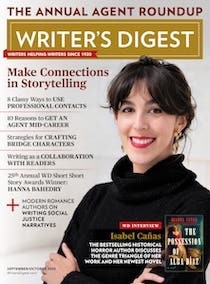7 Things I’ve Learned So Far, by Miranda Kenneally
Outside of personal experience, the best way to learn is to get advice from people who’ve been there and done that. Discover the seven things learned so far by author Miranda Kenneally.
This is a recurring column called “7 Things I’ve Learned So Far,”where writers (this installment written by Miranda Kenneally, author of the young adult debut CATCHING JORDAN) at any stage of their career can talk about writing advice and instruction as well as how they possibly got their book agent -- by sharing seven things they’ve learned along their writing journey that they wish they knew at the beginning.
1. Writing is still hard. Just because I have an agent and a book deal doesn’t mean that all my writing is supposed to come out perfectly the first time. Writing is still very hard work, no matter who believes in your raw talent.
2. Relationships are everything. I have such a supportive circle of friends. Without them, I never would’ve learned to write and I never would’ve learned about the industry.
3. Listen to all feedback – negative and positive. Without constructive criticism, I’d be nowhere. I can’t grow as a writer (or as a person, for that matter) if I don’t know where I’m missing the mark.
4. My truth isn’t everybody else’s truth. When building a world, it’s important to make sure that you adequately frame a person’s situation and beliefs. I mean, how could people be so evil as to make a little boy live in a cupboard under the stairs? Readers “buy” it because Mr. Dursley’s been painted as a man who abhors anything unordinary.
5. Trust your first instinct. My 7th grade science teacher once told me, “Miranda, a human being’s first instinct is correct 90% of the time. If you’re going to deviate from your first instinct, you’d better have a good reason why you should.” When I send out a first draft (or portions of a first draft) to beta readers, I’m always open-minded when comments start coming back to me, but before I consider implementing any suggested changes – I have to remind myself to think about why I wrote what I did in the first place. It’s very normal to feel silly or dumb after hearing comments, and immediately feel like you need to rush to do exactly what that person says — But you’ve also got to remember that you’re smart, too, and you wrote what you did for a reason.
6. Memorize your edit letters. I’ve found that before I dig in and start revising, it’s better to have a comprehensive understanding of what needs to be done, so when I start re-tackling the novel, it’s all in my mind and I can edit as I go. This is much easier than doing one thing at a time, and having to go through the manuscript several times to work individual plot points. So I guess what I’m saying is memorize the forest, not the trees.
7. Intros are everything. Most agents ask to see the first five to ten pages of a manuscript, but if you don't grab them on page one, they probably won't keep reading. The first sentence is the most crucial line in ANY book. Over the past few years, as the publishing industry has gotten more and more competitive, I've noticed an upswing in killer first lines. I spend a lot of time crafting the perfect first line in each book I write, and then I test it out on people (even those I never ask to beta read), just to see if it elicits a reaction.
Miranda Kenneally is the author of CATCHING JORDAN, acontemporary YA novel about football, femininity, and hot boys,released by Sourcebooks Fire in Dec. 2011. Miranda enjoysreading and writing young adult literature, and loves Star Trek,music, sports, Mexican food, Twitter, coffee, and her husband.Follow her on Twitter or see her author website here.



